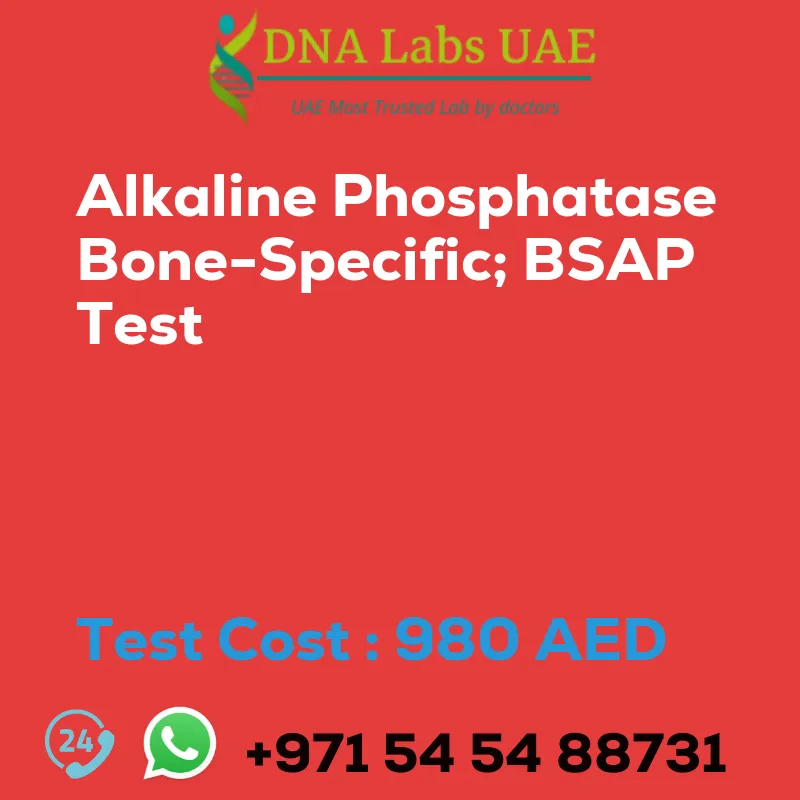ALKALINE PHOSPHATASE BONE-SPECIFIC; BSAP Test
Test Name: ALKALINE PHOSPHATASE BONE-SPECIFIC; BSAP Test
Components: Alkaline phosphatase bone-specific (BAP)
Price: AED 980.0
Sample Condition: 2 mL (1 mL min.) serum from 1 SST. Ship refrigerated or frozen.
Report Delivery: Report 10 days
Method: Immunoassay
Test Type: Osteoporosis
Doctor: Physician, Orthopedician
Test Department: OS
Pre Test Information: No special preparation required
Test Details:
The ALKALINE PHOSPHATASE BONE-SPECIFIC (BSAP) test is a blood test used to measure the level of bone-specific alkaline phosphatase (BAP) in the blood. Alkaline phosphatase is an enzyme that is produced by various tissues in the body, including the liver, intestines, and bones. The BSAP test specifically measures the level of alkaline phosphatase that is produced by bone cells. This can help in the diagnosis and monitoring of bone-related conditions, such as osteoporosis, Paget’s disease, and bone metastases.
Elevated levels of bone-specific alkaline phosphatase may indicate increased bone turnover, which can be a sign of bone diseases or conditions. On the other hand, decreased levels of BSAP may indicate reduced bone formation. The BSAP test is often used in conjunction with other bone markers and imaging tests to assess bone health and monitor the effectiveness of treatment. It is usually performed as part of a comprehensive bone panel, which includes other tests such as calcium, phosphorus, and vitamin D levels.
It is important to note that the BSAP test alone is not sufficient to diagnose or determine the severity of a bone condition. It should be interpreted in conjunction with clinical symptoms, medical history, and other diagnostic tests.
The BSAP test is a simple blood test that requires a small blood sample. The sample is usually drawn from a vein in the arm and sent to a laboratory for analysis. Results are typically available within a few days. It is recommended to consult with a healthcare provider for further information and interpretation of the BSAP test results.
| Test Name | ALKALINE PHOSPHATASE BONE-SPECIFIC; BSAP Test |
|---|---|
| Components | |
| Price | 980.0 AED |
| Sample Condition | 2 mL (1 mL min.) serum from 1 SST. Ship refrigerated or frozen. |
| Report Delivery | Report 10 days |
| Method | Immunoassay |
| Test type | Osteoporosis |
| Doctor | Physician,Orthopedician |
| Test Department: | OS |
| Pre Test Information | No special preparation required |
| Test Details |
The ALKALINE PHOSPHATASE BONE-SPECIFIC (BSAP) test is a blood test used to measure the level of bone-specific alkaline phosphatase (BAP) in the blood. Alkaline phosphatase is an enzyme that is produced by various tissues in the body, including the liver, intestines, and bones. The BSAP test specifically measures the level of alkaline phosphatase that is produced by bone cells. This can help in the diagnosis and monitoring of bone-related conditions, such as osteoporosis, Paget’s disease, and bone metastases. Elevated levels of bone-specific alkaline phosphatase may indicate increased bone turnover, which can be a sign of bone diseases or conditions. On the other hand, decreased levels of BSAP may indicate reduced bone formation. The BSAP test is often used in conjunction with other bone markers and imaging tests to assess bone health and monitor the effectiveness of treatment. It is usually performed as part of a comprehensive bone panel, which includes other tests such as calcium, phosphorus, and vitamin D levels. It is important to note that the BSAP test alone is not sufficient to diagnose or determine the severity of a bone condition. It should be interpreted in conjunction with clinical symptoms, medical history, and other diagnostic tests. The BSAP test is a simple blood test that requires a small blood sample. The sample is usually drawn from a vein in the arm and sent to a laboratory for analysis. Results are typically available within a few days. It is recommended to consult with a healthcare provider for further information and interpretation of the BSAP test results. |







